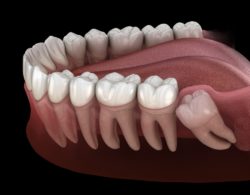During childhood, we lose our primary (baby) teeth and grow permanent (adult) teeth. Yet after adolescence, another set of teeth called wisdom teeth might grow. You often hear about wisdom teeth in the context of their removal. So why do we have these teeth and why do they require extraction?
You can feel more confident about your wisdom teeth and any necessary dental work by learning more about them. To alleviate potential dental fear, read on to find responses from your Sandy Springs, GA dentist to frequently asked questions about wisdom teeth.

What Are Wisdom Teeth?
Wisdom teeth refer to the third set of molars that begin to grow after adolescence, usually around ages 17 to 25, hence their name. People can have four wisdom teeth, one in each corner of the mouth. But some patients might have fewer than that, and some may have no wisdom teeth at all.
Early humans required the extra chewing power that wisdom teeth provided because their diets consisted of harsher foods. But as humans evolved, they turned to easier foods to eat and developed smaller jaws. So wisdom teeth are no longer necessary, and some people do not even have them.
Why Do I Need My Wisdom Teeth Removed?
You do not need your wisdom teeth, and in some cases, these extra teeth can pose a risk to your oral health. Because there is not usually room in the jaw or your mouth for these teeth, they can cause overcrowding that will disrupt your oral capabilities. They can also push your other teeth out of place, making them crooked and creating bite problems.
The wisdom teeth also have a high likelihood of becoming impacted. This means that the teeth get stuck in the bone before pushing through the gums. You can experience a great deal of pain if this occurs as well as a high risk of infection.
In any of these cases, your dentist will likely recommend the extraction of wisdom teeth. They can monitor the growth of these teeth through x-ray imaging taken during routine appointments. This way, they can intervene before these teeth cause major dental damage.
What Can I Expect from Wisdom Teeth Extraction?
If you and your dentist determine that you need your wisdom teeth extracted, they can perform the extraction procedure on all required teeth during one oral surgery. The dentist will give you a local anesthetic to numb the affected area so that you do not feel discomfort during this dental work. You can also discuss sedation options to help you relax further during this procedure.
The dentist will cut into the gum and remove the tooth from the jaw. They will stitch the incision at the completion of this procedure. Then you can return home and begin your recovery process.
You might feel sore and notice swelling as you begin to heal from the extraction at home. Your dentist will give you aftercare advice to help you minimize side effects and discomfort. You can expect it to take up to two weeks to heal fully after this procedure.
